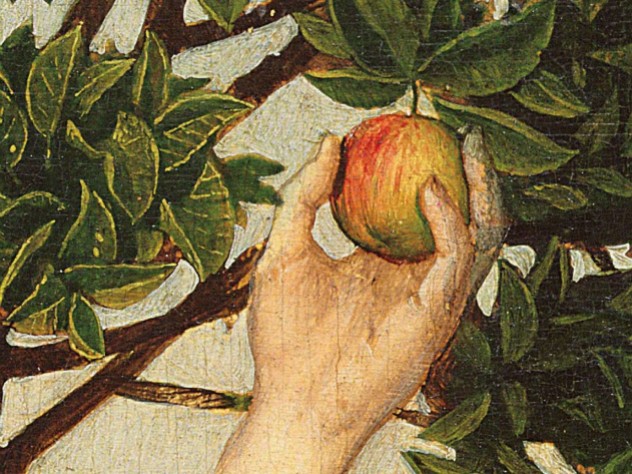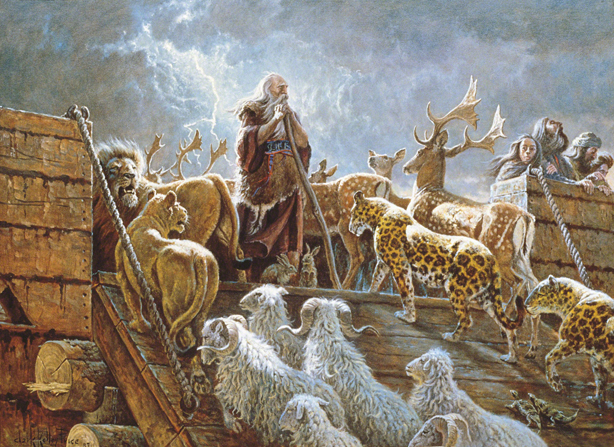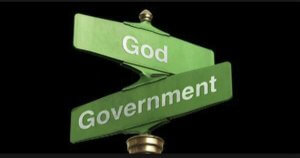
Introduction:
In our last post we started an overview of the Bible that focuses on major themes called: "A bird's-eye view of the Bible". Interested readers can review the last post by clicking on the link here: http://www.growingchristianresources.com/2020/01/birds-eye-view-of-bible-theme-of.html
We encountered our first theme of "Creation", noting how God created everything, life and humanity. Today's post will continue on our exploration and overview of the Bible through major themes. We will investigate the Fall of Adam and Eve in Genesis 3 and the subsequent ripple effects that would impact all of creation and humanity. The theme for today's post is what we will called: "catastrophe".
What is meant by the term "catastrophe"?

When we think of the consequences of the catastrophe of the fall, we first of all need to ask ourselves: "what is meant by 'catastrophe'. In simple terms, a catastrophe is a great-big disaster. Imagine baking the most beautiful cake in the world, complete with chocolate frosting and piped red roses. The cake has three-layers and is ready for eating. Suddenly, a large St. Bernard bounds out of nowhere, jumps upon the table and runs right through the cake! The dog then devours the cake, leaving crumbs and frosting everywhere all over the kitchen. One word can summarize the scene: catastrophe!
:max_bytes(150000):strip_icc()/Adam-and-Eve-GettyImages-171163783-584988e13df78ca8d5572385.jpg)
This horrific scene is a beautiful day in the park compared to the catastrophe of Adam and his wife’s rebellion in Genesis 3. In our last theme, we saw God creating and making everything. Furthermore, we discovered God is a relational God, and that He relates to our world by way of “covenants” or “binding agreements”. Sadly, Adam and his wife would make a fatal choice that would break the covenant of works God had made with them and thus, putting an end to the “age of innocence”.

In what follows under this second major theme, three main catastrophes or tragedies are recorded in Genesis 3-11: The Fall of Adam and Eve, the flood of Noah and the Tower of Babel. We will spend most of our time on the first of these, since all that unfolds throughout the rest of the Bible is related to the first catastrophe - "The Fall".
Catastrophe #1: The Fall
There are 1,189 chapters in our Bibles. Whenever we glance at the 1,189 chapters of the Biblical text, only four of those chapters record no sinfulness of any creature - Genesis 1-2 and Revelation 21-22. When God created everything, He did so without any imperfections. Genesis 1-2 presents a creation with no sin, heartache or death. Revelation 21-22 describes what will be a New Heavens and New Earth that are dominated by a God-centered, sinless reality (see also 1 Peter 3:13). So, what happened in the other 1,185 chapters of the Bible? What follows in the remainder of the Bible are the consequences of three major catastrophes: The Fall (Genesis 3-5), The Flood (Genesis 6-9) and the Tower of Babel (Genesis 10-11).

The first and greatest of these catastrophes is described by two jarring words, "The Fall". God had a special plan for mankind, namely, to implant within him His image and to have a covenant relationship with him. Human beings were not just physical creations, but also moral and spiritual beings.
Adam was to teach his wife everything God told him in the covenant of works - which fruits they could eat, which to avoid and their role in exercising God-given authority. God gave the newly married couple everything they needed to fulfill the covenant he gave them (Genesis 2). If they met God's conditions, they would enjoy an eternity with him, ruling the earth and populating the world with other people just like them. However, a great test was to come upon the man and the woman. The great enemy of man and God, Satan, entered the Garden. He tricked the woman (soon-to-be-named "Eve) into talking with him and eating of the forbidden fruit. Adam was there whenever Eve and the Serpent had their conversation. Adam's tolerance of the serpent meant he had broken that original covenant - for he and his wife were to take dominion over all life.

The outcome of Adam and Eve's decision to disobey God resulted in sin, leading to a curse and death on creation and the entire human race (see Genesis 3:7-19; Romans 5:12-21). Adam and Eve hid from God as God came down, walking in the garden He had planted, and which they were to care for (Genesis 3:5-8). The great catastrophe was underway in our world. Adam and his wife had broken God's original covenant of commands or "works". To review, God had told them that in the day they ate of the fruit of the tree of knowledge of good and evil, they would surely die. Adam and Eve died spiritually. They physically should had died too, since God was obligated to give them justice. However, God did something unexpected.

The Fall of Adam and his wife ultimately impacted all of us. The only thing God owed humanity was justice and judgment. However, God is a relational God and had already planned to extend a second covenant, called by Bible teachers: “the covenant of grace” (see Genesis 3:15, 20-21; Hosea 6:7). In this covenant of grace, God spoke about a future war between the serpent (Satan) and a descendant that would somehow come from Eve. What makes Genesis 3:15 so important is that it predicted what would be Jesus’ coming to earth to die on the cross for our sins.

When Adam heard this covenant spoken by God, he called his wife, "Eve", which means: "the mother of the living one". This response of Adam and Eve indicated that they received God's word by faith. God then killed two animals in their place, setting the pattern for salvation to come (Genesis 3:20-21). The ingredients of the Gospel were all present: God's grace, man's faith and the shedding of innocent blood were all present in God’s covenant of grace.
Catastrophe #2 – The Flood

It is from Genesis 3 to Genesis 11 that we find the catastrophe of The Fall spread to all humanity. The Fall was and still is the first great catastrophe. There are two other catastrophes we will mention before closing out this theme. In Genesis 6-9, we see Noah and his family in the second great catastrophe: the world-wide flood.

The wickedness of mankind had grown so badly that God decreed a flood of waters that would last for over a year. Sometimes Bible teachers describe God’s relationship with Noah as the beginnings of a new period in Biblical history, whereby God’s dealings with human beings was that of government. Mankind had failed in this arrangement God had made, much like Adam and Eve had broken God’s original covenant of works.

Thankfully, God never gives up and promises to never destroy the world with a flood of water with the accompanying sign of a rainbow. This promise God made to Noah and all humanity has similarities to God’s original covenant of grace with Adam and Eve: God’s grace, blood sacrifice and reception by faith (see Genesis 8:20-22). God gave a sign for His covenant with Noah - a rainbow. Whenever we see rainbows, we are reminded that God is ever true to His promises.
Catastrophe #3 – The Tower of Babel

Noah’s three sons – Shem, Ham and Japheth – would become the sources for the original seventy nations of the ancient world (see Genesis 10). As we already noted, God gave humanity the ability to govern according to His law which everyone knew about in their hearts (see Romans 2:14-15). Although the world-wide flood had wiped all but Noah and his family, the problem of sin was never taken-away.
Mankind had become numerous once again and was ready to severe any connections to the Creator in favor of worship false gods and goddesses. This would lead to the third great catastrophe - the Tower of Babel in Genesis 11. Whenever God saw that humanity was going to harm itself, He decreed that everyone speak different languages. This act of God resulted in humanity spreading across our globe. Although the world seemed darker than ever, God’s plans would go from dealing with the nations to one individual – Abraham. We will meet Abraham and his family in our next post as we continue our "bird's-eye survey" of the Bible.

No comments:
Post a Comment